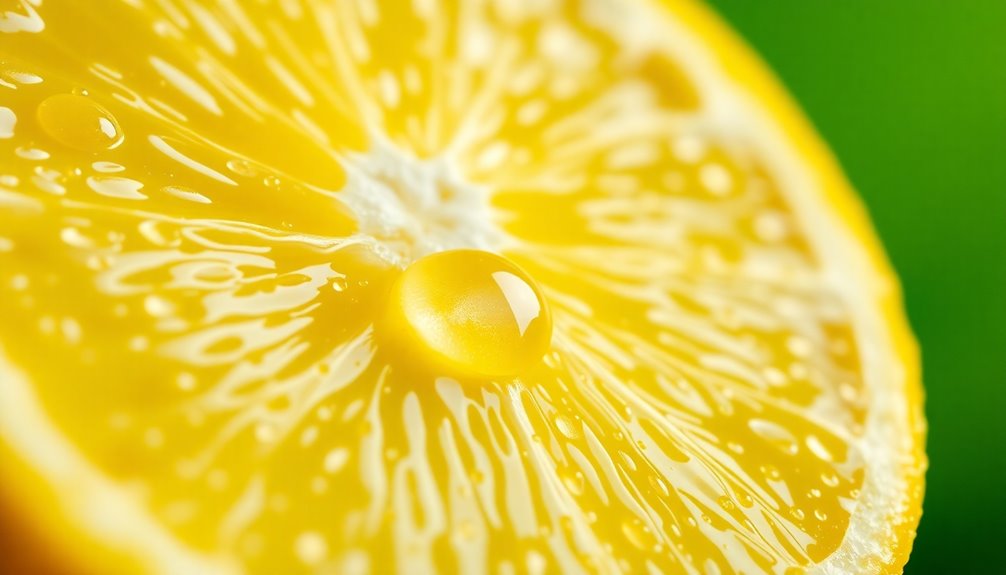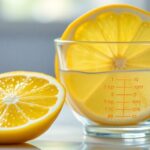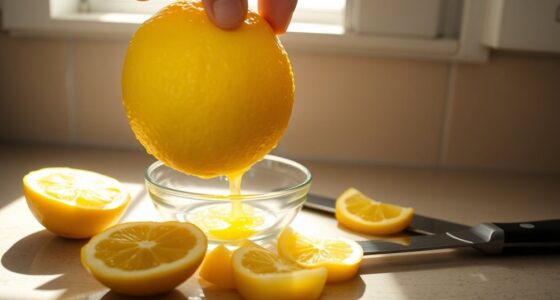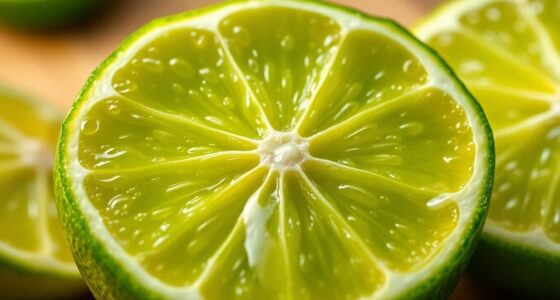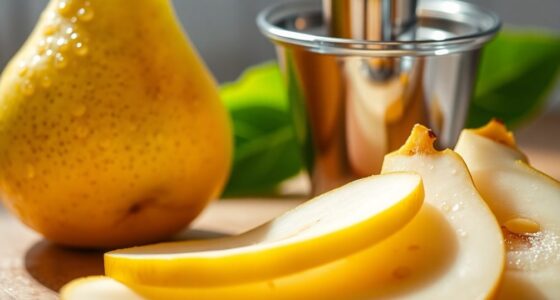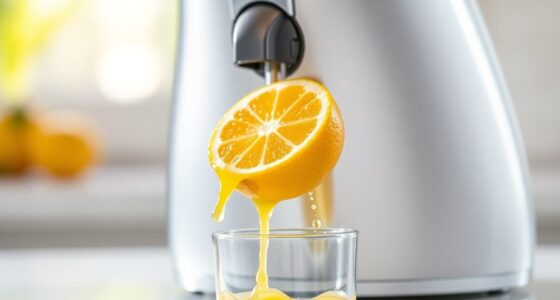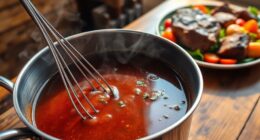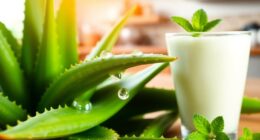A small lemon usually yields about 2 tablespoons of juice. If you're aiming for ½ cup, you'll need around 3 small lemons. The ripeness and weight of the lemon can affect juice yield, so choose heavier ones for more juice. Don't forget, rolling the lemon on the countertop can help release even more juice. Want to make the most of your lemons? There's more to learn about maximizing juice and selecting the best ones.
Key Takeaways
- A small lemon typically yields about 2 tablespoons of juice on average.
- Approximately 3 small lemons are needed to produce ½ cup of juice.
- Heavier small lemons generally contain more juice compared to lighter ones.
- Rolling the lemon before juicing can enhance the juice yield significantly.
- Ripe lemons are more likely to provide higher juice content than under-ripe lemons.
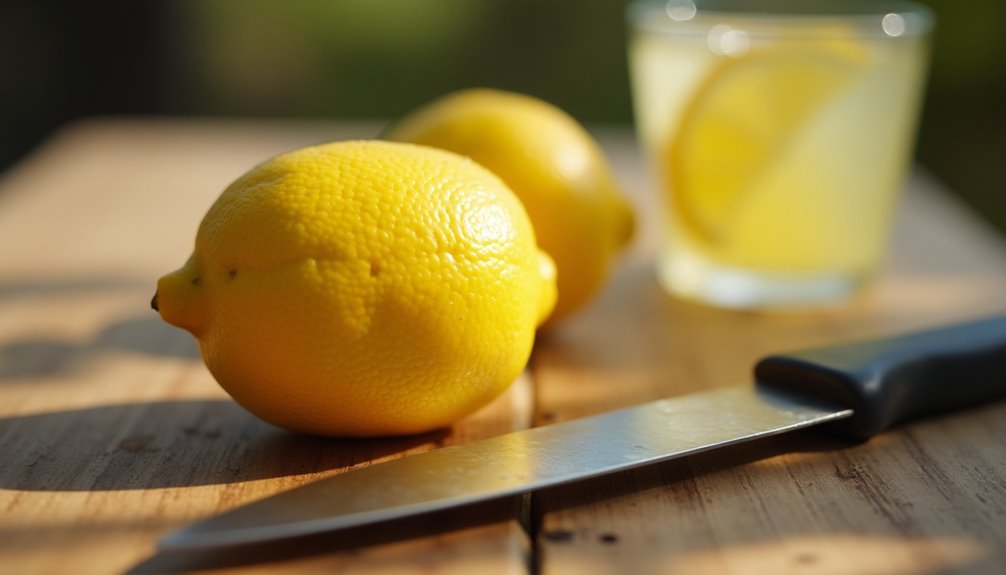
When you're squeezing a small lemon, you can expect to get about 2 tablespoons of juice. This juice yield can vary quite a bit depending on the lemon's ripeness and juiciness. If you're trying to maximize the amount of juice you get from a small lemon, consider its overall condition before you start squeezing. A ripe lemon tends to be heavier and gives up its juice more willingly, while an under-ripe one might leave you a bit disappointed.
The average weight of a very small lemon is around 2 to 2.5 ounces. This relatively light weight contributes to its lower juice yield compared to larger lemons. If you need about ½ cup of juice for a recipe, you'll likely need three small lemons to meet that requirement. So, when you're planning to make anything that calls for lemon juice, keep in mind how many lemons you'll need, especially if they're on the smaller side.
Before you start juicing, there's a handy trick you can use to boost that juice yield. Rolling the lemon on the countertop with a bit of pressure can help break down the internal membranes, allowing more juice to be released. This simple technique can make a noticeable difference, so don't skip it! It's especially helpful when dealing with small lemons, which may not have a lot of juice to spare.
When you're selecting lemons, consider the size and the feel. A small lemon mightn't look like much, but if it feels heavy for its size, it's likely packed with juice. Conversely, a light small lemon might indicate that it's not fully ripe or juicy, meaning you'll end up with less juice than you hoped for.
Juicing is an essential skill, especially if you love cooking or baking with fresh ingredients. Whether you're making a lemon vinaigrette, a cake, or a refreshing drink, understanding the juice yield of a small lemon can help you plan better. The juiciness of the lemon can also influence the overall flavor profile of your dish, so it's worth paying attention to.
Frequently Asked Questions
How Much Is the Juice of One Small Lemon?
When you're juicing a small lemon, you'll typically get about 2 tablespoons of juice.
Keep in mind that this amount can vary based on the lemon's ripeness and variety.
If you need more juice for your recipe, it's a good idea to use two small lemons, which can give you around 4 tablespoons.
This way, you can ensure you have enough lemon flavor without using a larger fruit.
Can I Use Bottled Lemon Juice Instead of Fresh Lemon?
You can definitely use bottled lemon juice instead of fresh lemon, but keep in mind the flavor difference.
Bottled juice often contains preservatives and may not give you that bright, vibrant taste you want in certain recipes. If you're cooking or baking, it can work well, but for drinks or salads, fresh juice is usually better.
Always taste and adjust the amount to achieve the flavor you desire when substituting.
How Much Juice Is in an Average Size Lemon?
So, you think lemons are just sour little orbs of disappointment? Think again! An average lemon packs around 3 tablespoons of juice—definitely not something to scoff at during your culinary endeavors.
If you're squeezing one for a recipe, you'll find that this citrus superstar can brighten up your dish. Just remember, rolling it on the counter first will help you extract every last drop. Fresh juice beats bottled, hands down!
How Much Real Lemon Equals the Juice of One Lemon?
To replace the juice of one lemon, you can use about 3 tablespoons of Real Lemon juice.
Since one medium lemon typically yields that amount, using Real Lemon is a convenient alternative when you're out of fresh lemons.
Just remember, if you need to adjust for taste in recipes, you might want to start with a little less and add more as needed.
It's all about achieving that perfect balance!
Conclusion
So, the next time you reach for that small lemon, remember—it might surprise you. Just a couple of tablespoons of juice can elevate your dish or drink in ways you never imagined. But what if that little fruit holds even more secrets? Could it be the key ingredient you've been missing all along? Don't underestimate its power. Grab that lemon, squeeze it, and find out how it can transform your culinary creations in an instant.
Cindy thoroughly researches juicing trends, techniques, and recipes to provide readers with practical advice and inspiration. Her writing style is accessible, engaging, and designed to make complex concepts easy to understand. Cindy’s dedication to promoting the advantages of juicing shines through her work, empowering readers to make positive changes in their lives through the simple act of juicing.

